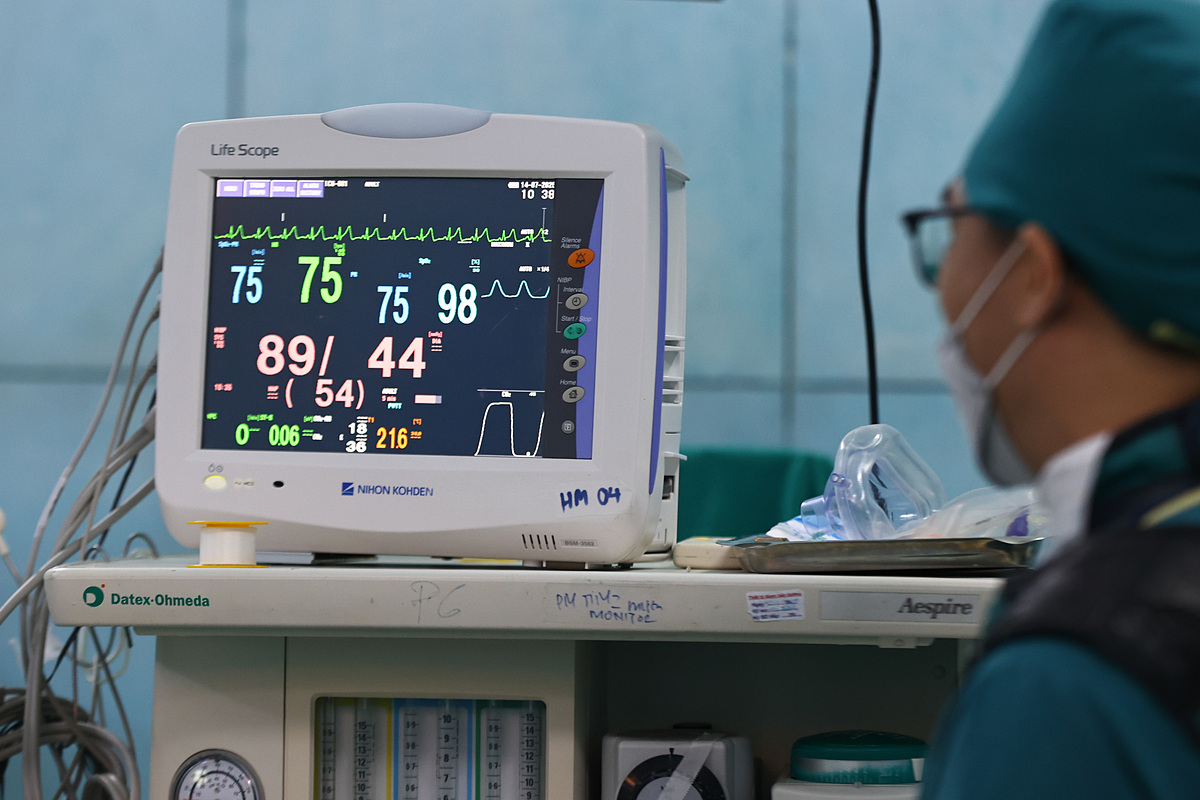On 3/8, Dr. Cao Hoai Tuan Anh, Deputy Director of Nhan 115 Hospital, reported that upon arrival, the young woman was in a deep coma with undetectable blood pressure and quickly went into cardiac and respiratory arrest. The emergency team performed CPR, intubated her, initiated mechanical ventilation, and administered vasopressors. She experienced ventricular fibrillation requiring multiple defibrillations. After 20 minutes of advanced cardiopulmonary resuscitation, her heart resumed a weak beat, but her blood pressure remained undetectable. Her chances of survival were slim.
During the emergency, doctors quickly gathered information from her friend. The 25-year-old woman, an office worker living alone, used electronic cigarettes and showed no signs of suicidal ideation. Two days prior, she experienced fatigue and mild confusion. At a hospital visit, her test results were normal, and she declined hospitalization against medical advice. Her condition worsened at home, leading to her collapse and subsequent emergency admission.
Facing imminent death, the doctors decided to mobilize all resources and immediately initiate ECMO. The intervention team, consisting of doctors Nguyen Huu Tin, Vu Phan Anh Tuan, Pham Mai Hung, and Vo Hoai Quyen, quickly took their positions. However, just as they were about to begin, the patient's heart stopped again, putting the team in a difficult situation.
"We'll perform CPR while initiating ECMO," the doctors quickly agreed. Off-duty doctors were called in to assist with this advanced life-support technique.
Throughout the procedure, the patient's heart repeatedly stopped. Her pupils were dilated to 4-5 mm with no light reflex – alarming signs. ECMO was successfully established and functioning smoothly, and maximum doses of vasopressors were administered. Yet, the arterial blood pressure monitor displayed a flat line, indicating her heart had almost completely stopped functioning, and her life depended entirely on the machine.
"From a medical perspective, her death would be understandable, but for resuscitation specialists, who constantly stand on the fine line between life and death, it wasn't time to give up," said Dr. Anh.
Time passed heavily. On the bedside ultrasound monitor, the young woman's heart remained still. Hope dwindled. Then, miraculously, her heart resumed a faint beat, signaling a chance for survival. The medical team was overjoyed, clinging to hope.
However, the battle was far from over. While the patient was temporarily stabilized with ECMO, continuous renal replacement therapy, and numerous vasopressors, the cause of her sudden cardiac arrest remained a mystery. Having survived the initial crisis, she remained in a deep coma. With no family present and no one living with her to provide further medical history, the search for the cause reached an impasse. Extensive tests, including toxicology screenings, yielded no answers.
As efforts continued, the woman suddenly showed signs of acute blood loss. The medical team was thrust into another life-or-death struggle. They had to identify the source of bleeding and replenish a significant blood volume under extremely challenging circumstances – the patient had the rare A Rh-negative blood type.
The medical team immediately contacted the Ho Chi Minh City Blood Transfusion Hematology Hospital to prioritize emergency blood supply and mobilize blood donors. The hospital also proactively searched for individuals with the same blood type among relatives and hospital staff, finding one staff member ready to donate if needed.
Finding the source of bleeding became the top priority. Otherwise, any transfused units of the precious, rare blood would continue to be lost. Ultrasound and CT scans revealed a large amount of fluid in the abdomen, suggesting free blood. Without delay, the patient was rushed into emergency surgery while ECMO continued to operate.
Dr. Phan Luong Huy, from the Department of General Surgery, performed an emergency laparoscopy and located the bleeding source in segment 4 of the liver. The team successfully cauterized the bleeding, stabilizing the hemorrhage. Her hemoglobin levels were closely monitored, showing no further decline. Her hemodynamics gradually improved, and ECMO was discontinued after more than a week. She gradually regained consciousness, showing significant improvement in liver and kidney function, as well as mental state. She was weaned off the ventilator and extubated, with no neurological deficits despite multiple cardiopulmonary arrests.
However, her condition still prevented doctors from obtaining a clear history of substances she may have used. "This is a case we've never encountered before. We hope that in the coming days, as her mental state improves, the situation will become clearer," Dr. Tuan Anh shared.
 |
Medical staff monitor a patient's vital signs in an operating room at a hospital in Ho Chi Minh City. Photo: Quynh Tran |
Medical staff monitor a patient's vital signs in an operating room at a hospital in Ho Chi Minh City. Photo: Quynh Tran
Le Phuong












